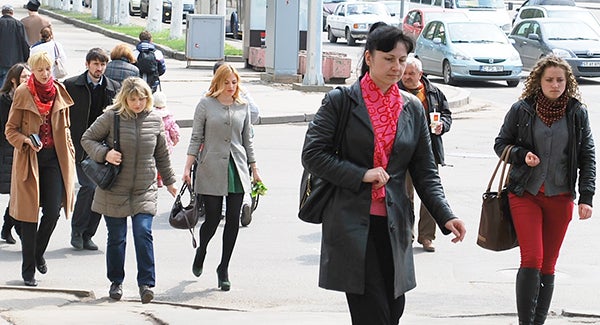My last post discussed
the challenges and reforms of Moldova’s pension system, but I would like to focus now on the incentives for contributing into a pension system. This issue is especially important for a country like Moldova, where old-age pensions are directly related to the number of contribution years and the level of individual earnings.

Such pension schemes typically envisage some level of redistribution to address poverty and equity concerns. However, excessive redistribution decreases the incentive to contribute to the pension system.
An effectively functioning incentives structure is critical to encouraging workers to contribute more in return for an adequate pension at retirement. Why? Because if the right incentives are not in place, people will avoid contributing into a system that doesn’t offer more than the minimum pension – regardless of the level of contribution.
So, in terms of incentives structure, what particular challenges does Moldova face?
First of all, pension benefits are relatively low in Moldova, while the incentives structure is relatively flat – the minimum pension represents approximately 70 percent of the average pension. There are several reasons behind this.
One reason is the lack of indexation of past earnings (so-called “valorization”). The wages used for calculating pension benefits for the period preceding 1999 are indexed with wage growth, while the wages earned afterwards are taken at their nominal value. This affects the level of initial pension benefits set at retirement. In this way, future retirees will see a decrease in the amount of pension they get as a percentage of their salary. This is known as the replacement rate.
Secondly, people get the minimum pension at a level guaranteed by the state, if they have the required years of service – but their benefits are lower than the minimum threshold. The current minimum pension policy reflects the government’s efforts to protect the living standards of low-income individuals. But, this approach compresses the benefits structure and weakens incentives to contribute.
A good example to illustrate the redistribution effect of the minimum pension is that of agricultural workers and farmers – most of whom earn minimum pension benefits. Since 2008, individual farmers have not been required to contribute at all. As a result, the contributions paid in 2012 by the agricultural sector made up only 5 percent of total social insurance revenues, while farmers’ pensions comprised more than 30 percent of all pension expenditures!
Rural poverty in Moldova remains a major concern. To address poverty effectively, targeted social assistance programs are needed, rather than allowing the burden to rest on those who contribute and who will be getting much less in pensions when they retire.
Thirdly, the existence of special and privileged pension schemes is another disincentive in the pension system. Despite several changes adopted recently which aim to converge special and regular pension schemes, there are groups of retirees who continue to enjoy privileged benefits without paying higher contributions.
The persistent decline in the number of contributors seriously jeopardizes the future of the Moldovan pension system. Policy-makers must get the incentives right in order to prevent further erosion of the system.
So, what can be done?
Moldovan authorities would be well-advised to re-introduce valorization in the pension benefit formula. This would mean higher benefits for new retirees. The authorities could also address minimum income through general revenues, rather than subsidizing minimum pensions from contributions.
And, Moldova should move fast to eliminate special and privileged benefits from the pension system, and put in place a system that is equitable and fair to all contributors.
Let me know what you think ...

Such pension schemes typically envisage some level of redistribution to address poverty and equity concerns. However, excessive redistribution decreases the incentive to contribute to the pension system.
An effectively functioning incentives structure is critical to encouraging workers to contribute more in return for an adequate pension at retirement. Why? Because if the right incentives are not in place, people will avoid contributing into a system that doesn’t offer more than the minimum pension – regardless of the level of contribution.
So, in terms of incentives structure, what particular challenges does Moldova face?
First of all, pension benefits are relatively low in Moldova, while the incentives structure is relatively flat – the minimum pension represents approximately 70 percent of the average pension. There are several reasons behind this.
One reason is the lack of indexation of past earnings (so-called “valorization”). The wages used for calculating pension benefits for the period preceding 1999 are indexed with wage growth, while the wages earned afterwards are taken at their nominal value. This affects the level of initial pension benefits set at retirement. In this way, future retirees will see a decrease in the amount of pension they get as a percentage of their salary. This is known as the replacement rate.
Secondly, people get the minimum pension at a level guaranteed by the state, if they have the required years of service – but their benefits are lower than the minimum threshold. The current minimum pension policy reflects the government’s efforts to protect the living standards of low-income individuals. But, this approach compresses the benefits structure and weakens incentives to contribute.
A good example to illustrate the redistribution effect of the minimum pension is that of agricultural workers and farmers – most of whom earn minimum pension benefits. Since 2008, individual farmers have not been required to contribute at all. As a result, the contributions paid in 2012 by the agricultural sector made up only 5 percent of total social insurance revenues, while farmers’ pensions comprised more than 30 percent of all pension expenditures!
Rural poverty in Moldova remains a major concern. To address poverty effectively, targeted social assistance programs are needed, rather than allowing the burden to rest on those who contribute and who will be getting much less in pensions when they retire.
Thirdly, the existence of special and privileged pension schemes is another disincentive in the pension system. Despite several changes adopted recently which aim to converge special and regular pension schemes, there are groups of retirees who continue to enjoy privileged benefits without paying higher contributions.
The persistent decline in the number of contributors seriously jeopardizes the future of the Moldovan pension system. Policy-makers must get the incentives right in order to prevent further erosion of the system.
So, what can be done?
Moldovan authorities would be well-advised to re-introduce valorization in the pension benefit formula. This would mean higher benefits for new retirees. The authorities could also address minimum income through general revenues, rather than subsidizing minimum pensions from contributions.
And, Moldova should move fast to eliminate special and privileged benefits from the pension system, and put in place a system that is equitable and fair to all contributors.
Let me know what you think ...


Join the Conversation